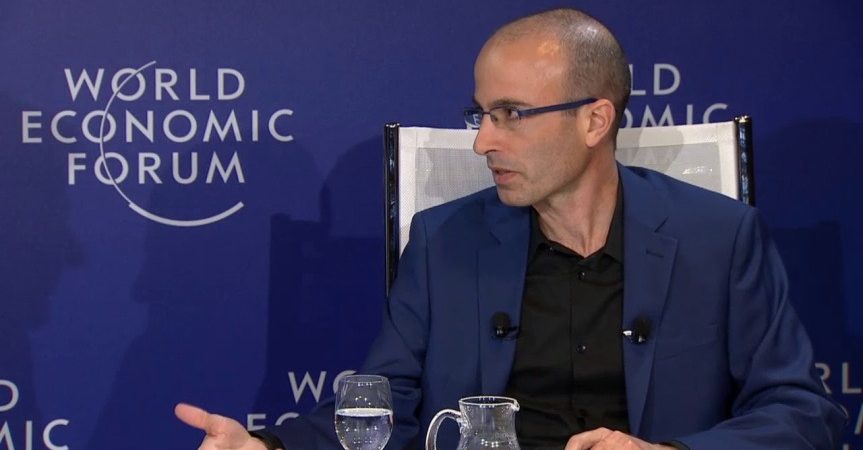This blog was originally published on December 13, 2018 in Patterns of Meaning
Yuval Harari’s writings explode many fictions on which modern civilization is based. However, his own unacknowledged fictions perpetuate dangerous myths. In this article, I urge Harari to recognize his own implicit stories, and by doing so, step up to his full potential role in helping shape humanity’s future.
When Yuval Noah Harari speaks, the world listens. Or at least, the world’s reading public. His first two blockbusters, Sapiens: A Brief History of Humankind, and Homo Deus: A Brief History of Tomorrow, have sold 12 million copies globally, and his new book, 21 Lessons for the 21stCentury, is on bestseller lists everywhere. His fans include Barack Obama, Bill Gates, and Mark Zuckerberg, he’s admired by opinion shapers as diverse as Sam Harris and Russell Brand, and he’s fêted at the IMF and World Economic Forum.
A galvanizing theme of Harari’s writing is that humans are driven by shared, frequently unacknowledged fictions. Many of these fictions, he rightly points out, underlie the concepts that organize society, such as the value of the US dollar or the authority of nation states. In critiquing the current vogue topic of “fake news,” Harari piercingly observes that this is nothing new, but has been around for millennia in the form of organized religion.
However, apparently unwittingly, Harari himself perpetuates unacknowledged fictions that he relies on as foundations for his own version of reality. Given his enormous sway as a public intellectual, Harari risks causing considerable harm by perpetuating these fictions. Like the traditional religious dogmas that he mocks, his own implicit stories wield great influence over the global power elite as long as they remain unacknowledged. I invite Harari to examine them here. By recognizing them as the myths they actually are, he could potentially transform his own ability to help shape humanity’s future.
Fiction #1: Nature Is a Machine
One of Harari’s most striking prophecies is that artificial intelligence will come to replace even the most creative human endeavors, and ultimately be capable of controlling every aspect of human cognition. The underlying rationale for his prediction is that human consciousness—including emotions, intuitions, and feelings—is nothing more than a series of algorithms, which could all theoretically be deciphered and predicted by a computer program. Our feelings, he tells us, are merely “biochemical mechanisms” resulting from “billions of neurons calculating” based on algorithms honed by evolution.
The idea that humans—and indeed all of nature—can be understood as very complicated machines is in fact a uniquely European cultural myth that arose in the 17th century and has since taken hold of the popular imagination. In the heady days of the Scientific Revolution, Descartes declared he saw no difference “between the machines made by craftsmen and the various bodies that nature alone composes.” The preferred machine metaphor is now the computer, with Richard Dawkins (apparently influencing Harari) writing that “life is just bytes and bytes and bytes of digital information,” but the idea remains the same—everything in nature can ultimately be reduced to its component parts and understood accordingly.

This myth, however attractive it might be to our technology-driven age, is as fictional as the theory that God created the universe in six days. Biologists point out principles intrinsic to life that categorically differentiate it from even the most complicated machine. Living organisms cannot be split, like a computer, between hardware and software. A neuron’s biophysical makeup is intrinsically linked to its behavior: the information it transmits doesn’t exist separately from its material construction. As prominent neuroscientist Antonio Damasio states in The Strange Order of Things, Harari’s assumptions are “not scientifically sound” and his conclusions are “certainly wrong.”
The dangers of this fiction arise when others, along with Harari, base their ideas and plans on this flawed foundation. Believing nature is a machine inspires a hubristic arrogance that technology can solve all humanity’s problems. Molecular biologists promote genetic engineering to enhance food production, while others advocate geo-engineering as a solution to climate breakdown—strategies fraught with the risk of massive unintended consequences. Recognizing that natural processes, from the human mind to the entire global ecosystem, are complex, nonlinear, and inherently unpredictable, is a necessary first step in crafting truly systemic solutions to the existential crises facing our civilization.
Fiction #2: “There Is No Alternative”
When Margaret Thatcher teamed up with Ronald Reagan in the 1980s to impose the free-market, corporate-driven doctrine of neoliberalism on the world, she famously used the slogan “There Is No Alternative” to argue that the other two great ideologies of the twentieth century—fascism and communism—had failed, leaving her brand of unrestrained market capitalism as the only meaningful choice.
Astonishingly, three decades later, Harari echoes her caricatured version of history, declaring how, after the collapse of communism, only “the liberal story remained.” The current crisis, as Harari sees it, is that “liberalism has no obvious answers to the biggest problems we face.” We now need to “craft a completely new story,” he avers, to respond to the turmoil of modern times.

Sadly, Harari seems to have missed the abundant, effervescent broth of inspiring visions for a flourishing future developed over decades by progressive thinkers across the globe. He appears to be entirely ignorant of the new foundations for economics proffered by pioneering thinkers such as Kate Raworth; the exciting new principles for a life-affirming future within the framework of an Ecological Civilization; the stirring moral foundation established by the Earth Charter and endorsed by over 6,000 organizations worldwide; in addition to countless other variations of the “new story” that Harari laments is missing. It’s a story of hope that celebrates our shared humanity and emphasizes our deep connection with a living earth.
The problem is not, as Harari argues, that we are “left without any story.” It is, rather, that the world’s mass media is dominated by the same overpowering transnational corporations that maintain a stranglehold over virtually all other aspects of global activity, and choose not to give a platform to the stories that undermine the Thatcherian myth that neoliberalism is still the only game in town.
Harari, with his twelve million readers and reverential following among the global elite, is well positioned to apprise mainstream thinkers of the hopeful possibilities on offer. In doing so, he would have the opportunity to constructively influence the future that—as he rightly points out—holds terrifying prospects without a change in direction. Is he ready for this challenge? First, perhaps, he would need to investigate the assumptions underlying Fiction #3.
Fiction #3: Life Is Meaningless—It’s Best to Do Nothing
Yuval Harari is a dedicated meditator, sitting for two hours a day to practice vipassana(insight) meditation, which he learned from the celebrated teacher Goenka. Based on Goenka’s tutelage, Harari offers his own version of the Buddha’s original teaching: “Life,” he writes, “has no meaning, and people don’t need to create any meaning.” In answer to the question as to what people should do, Harari summarizes his view of the Buddha’s answer: “Do nothing. Absolutely nothing.”
As a fellow meditator (though not as steadfast as Harari) and great admirer of Buddhist principles, I share Harari’s conviction that Buddhist insight can help reduce suffering on many levels. However, I am concerned that, in distilling the Buddha’s teaching to these sound bites, Harari gives a philosophical justification to those who choose to do nothing to avert the imminent humanitarian and ecological catastrophes threatening our future.
The statement that “life has no meaning” seems to arise more from the modern reductionist ontology of physicist Steven Weinberg than the mouth of the Buddha. To suggest that “people don’t need to create any meaning” contradicts an evolved instinct of the human species. As I describe in in my own book, The Patterning Instinct: A Cultural History of Humanity’s Search for Meaning, human cognition drives us to impose meaning into the universe, a process that’s substantially shaped by the culture a person is born into. However, by recognizing the underlying structures of meaning instilled in us by our own culture, we can become mindful of our own patterns of thought, thus enabling us to reshape them for more beneficial outcomes—a process I call “cultural mindfulness.”

There are, in fact, other interpretations of the Buddha’s core teachings that lead to very different distillations—ones that cry out “Do Something!”, inspiring meaningful engagement in worldly activities. The principle of dependent origination, for example, emphasizes the intrinsic interdependence of all aspects of existence, and forms the basis for the politically engaged Buddhism of prominent monk and peace activist, Thích Nhất Hạnh. Another essential Buddhist practice is metta, or compassion meditation, which focuses on identifying with the suffering of others, and resolving to devote one’s own life energies to reducing that suffering. These are sources of meaning in life that are fundamentally consistent with Buddhist principles.
Fiction #4: Humanity’s Future Is a Spectator Sport
A distinguishing characteristic of Harari’s writing, and one that may account for much of his prodigious success, is his ability to transcend the preconceptions of everyday life and offer a panoramic view of human history—as though he’s orbiting the earth from ten thousand miles and transmitting what he sees. Through his meditation practice, Harari confides, he has been able to “actually observe reality as it is,” which gave him the focus and clear-sightedness to write Sapiens and Homo Deus. He differentiates his recent 21 Lessons for the 21st Century from his first two books by declaring that, in contrast to their ten thousand-mile Earth orbit, he will now “zoom in on the here and now.”
While the content of his new book is definitely the messy present, Harari continues to view the world as if through a scientist’s objective lens. However, Harari’s understanding of science appears to be limited to the confines of Fiction #1—“Nature Is a Machine”—which requires complete detachment from whatever is being studied. Acknowledging that his forecast for humanity “seems patently unjust,” he justifies his own moral detachment, retorting that “this is a historical prediction, not a political manifesto.”
In recent decades, however, systems thinkers in multiple scientific disciplines have transformed this notion of pristine scientific objectivity. Recognizing nature as a dynamic, self-organized fractal complex of nonlinear systems, which can only be truly understood in terms of how each part relates to each other and the whole, they have shown how these principles apply, not just to the natural world, but also our own human social systems. A crucial implication is that the observer is part of what is being observed, with the result that the observer’s conclusions and ensuing actions feed back into the very system being investigated.
This insight holds important ethical implications for approaching the great problems facing humanity. Once you recognize that you are part of the system you’re analyzing, this raises a moral imperative to act on your findings, and to raise awareness of others regarding their own intrinsic responsibilities. The future is not a spectator sport—in fact, every one of us is on the team and can make a difference in the outcome.
Yuval Harari: please step up
Yuval Harari—I urge you to recognize your own fictions. It’s clear to me that you are a caring, compassionate person of high integrity. You’ve shown your willingness to advocate on behalf of those who suffer, as in Sapiens where you brought attention to the atrocity of factory farming. You must be aware that sixty percent of all wild animals on Earth have been annihilated since the decade when you were born; that UN scientists give us just twelve yearsto avoid a point of no return in our climate emergency.
The Earth itself now needs your advocacy. Please recognize that nature is alive; that there are alternative stories on offer; that there is a moral imperative at this moment to engage in helping turn around our civilization’s path to destruction. If you’re interested to consider these questions, I offer you scholarly sources here for further inquiry. There are twelve million people, including influential power brokers, who would respond to your intellectual leadership. I implore you to step up and play your full potential role in helping shape humanity’s future.
Jeremy Lent is author of The Patterning Instinct: A Cultural History of Humanity’s Search for Meaning, which investigates how different cultures have made sense of the universe and how their underlying values have changed the course of history. He is founder of the nonprofit Liology Institute, dedicated to fostering a sustainable worldview. For more information visit jeremylent.com
The MAHB Blog is a venture of the Millennium Alliance for Humanity and the Biosphere. Questions should be directed to joan@mahbonline.org
The views and opinions expressed through the MAHB Website are those of the contributing authors and do not necessarily reflect an official position of the MAHB. The MAHB aims to share a range of perspectives and welcomes the discussions that they prompt.
